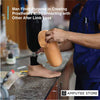Rise Bionics: Providing High-Quality, Affordable Orthotics & Prosthetics in India
The solution to many of humanity’s problems can often be found in the environment at a much lower cost. Arun Cherian, the founder of Rise Bionics, got the inspiration to develop high-quality yet affordable orthotics and prosthetics in 2014 after seeing the old cane furnishings during a visit to his childhood home in southern India.

The furniture, made from rattan trees, had been in the house for many years, yet with its complex geometry, it remained stable and flexible, like a spring. Cherian began to wonder if the material could be used for prosthetic legs.
By then, Cherian had already earned his master’s degree in mechanical engineering at Columbia University and spent four years as a researcher at the University of California, Berkeley. But he decided to quit his Ph.D. studying the biomechanics of human movement at Purdue University to pursue his idea.
The universe was on his side. In 2015, he attended the annual International Development and Design Summit hosted by MIT D-Lab, after receiving information that it would take place in India that year. The MIT D-Lab’s mission is to work with people worldwide to develop practical solutions to global poverty challenges.
The summit spanned three weeks, which gave Cherian enough time to work through the D-Lab design philosophy, define the problem he wanted to solve, and refine his approach before building his product.
In 2016, Cherian was selected to join the MIT D-Lab Scale-Ups Fellowship, which gave him the networking opportunities, mentorship, and financial support needed to help Rise Bionics scale. In an interview with MIT News, Cherian said the fellowship was hugely instrumental in helping the start-up company get to where it is today.
Later that same year, the quality of Rise Bionics’ devices were tested as the company participated in the 2016 Cybathlon in Switzerland. During the event, adaptive athletes would wear the world’s best prosthetic devices to compete in athletic events. The world’s biggest prosthesis manufacturers typically join the Cybathlon with expensive, advanced devices specially made for the competition. However, Rise Bionics’ $300 device beat all others by winning two of the three races and logging the fastest time at the event.
Today, Rise Bionics does more than produce prosthetic legs; they offer customized prosthetics and orthotics for people with limb loss and those suffering from conditions like scoliosis, cerebral palsy, and epilepsy. The company has also developed a better workflow for fitting patients with custom assistive devices in a matter of hours instead of weeks. Cherian says Rise Bionics can produce over 40 custom prosthetic devices per week.
Rise Bionics has made high-quality prosthetics and orthotics accessible to anyone, from rickshaw drivers in community hospitals to affluent patients in expensive hospitals. This is because they provide high-quality prosthetics and orthotics at 30% to 50% of the cost of competitors’ devices.
During the pandemic, Rise Bionics has provided devices at no cost to special needs children from low-income communities through the Help A Child Walk program. The company worked with its more affluent patients and donors for the device sponsorships. The program has helped more than 90 children get assistive devices.
Although Rise Bionics is currently only based in India, partnerships in North America, Brazil, Africa, and the Middle East are in the works.









































































